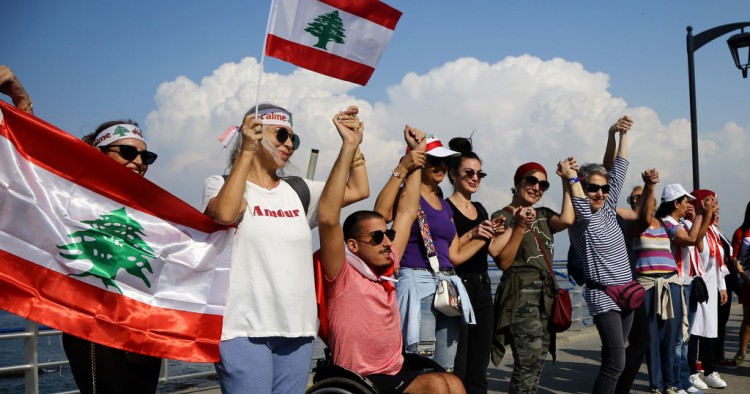Lebanon’s protests entered their 12th day with the government and the protesters at a standstill. Speeches by the president, the prime minister, and Hezbollah’s secretary-general defined the government stance: implementation of an emergency reform package including anti-corruption laws and measures to fix state finances such as accelerating long-delayed plans to overhaul the state-run electricity sector. All three officials did not show a readiness to cede to protesters’ principal demand for the government’s resignation and the formation of a non-partisan technocrat-led council of ministers to oversee a transitional period, leading to early parliamentary elections held according to a new electoral law and the sitting of a new parliament to elect a new president and form a new cabinet.
Banks have been closed for nine days, a situation without precedent even during the country’s 15-year civil war. There are fears of a bank run, and of depositors’ rush to withdraw their savings once banks reopen. The governor of the Lebanese Central Bank issued a statement on Oct. 28 saying the country is just days away from economic collapse if a solution to the crisis is not found quickly.
In his speech on Oct. 25, Hezbollah’s secretary-general, Hassan Nasrallah, said that they do not endorse the government’s resignation and they oppose the president’s resignation and the holding of early parliamentary elections. He warned the country faces a choice between two pathways out of this current crisis: either a dialogue between the government and the leadership of the protest movement, or a civil war.
The protest movement is leaderless, self-funded, and non-sectarian in character. It has proven to be very creative in the use of non-violent methods, communication strategies, and slogans to keep the people mobilized and unified. It remains to be seen how resilient the protest movement is and how long it can remain mobilized for, especially if political leaders refuse to change their stance.
Protesters have expressed fears that were they to form a leadership, those leaders will be the targets of physical intimidation, elimination, or co-optation in the usual style of divide-and-rule which the political class has deftly deployed in the past to undermine other protest movements.
The ruling clique is betting that time is on their side. The economic situation, if left attended, will continue to deteriorate, leading to the closures of many private companies with more people losing their livelihood. To date the government has been paying the salaries of public sector employees. However, were there to be a liquidity crisis, it would also affect that sector of the population.
Hezbollah is facing unprecedented opposition in its core base. While this opposition has yet to lay the blame for their economic woes at Nasrallah’s doorstep, it has focused its protests around the issues of corruption, lack of jobs, and poor governance, mostly blaming this state of affairs on the corruption of officials, including Nabih Berri, speaker of parliament and Hezbollah ally. This opposition has yet to address the issues of Hezbollah’s weapons and the cost of its intervention in Syria. To date, the protests in Hezbollah strongholds in the south and northeast of Lebanon have been small in scale.
What is the way out? The protest movement could persist for a few more weeks. However, time is not on their side. Deteriorating economic conditions might hurt their cause with the non-protesting sectors of the population as they start to blame the protests for this state of affairs. The president offered to have a dialogue with the protesters, and Hezbollah’s secretary-general supported the offer while raising doubts about whether the protest movement can develop a unified leadership. In the meantime, the government will try to hold its business-as-usual meetings to discuss the implementation of the reform measures proposed by the prime minister. Officials want to present the public with a split-screen reality: on one side of the screen the cabinet meeting about reforms, and on other side protesters erecting roadblocks on the streets.
The international community has so far stayed out of the situation. The few statements by embassies and back-channel messages to Lebanese officials have been limited to reaffirming the protesters’ right to peaceful demonstration, as guaranteed by the Lebanese army and Internal Security Forces, including riot police. The latter have behaved admirably and one positive thing that will come out of these protests is a renewed faith of the Lebanese in the professionalism, non-partisanship, and capabilities of the army and security forces.
As long as the protest movement remains leaderless, it will be hard for the outside community to endorse measures such as the resignation of the government because they would be afraid of chaos and a political and security vacuum. And as long as the protests are leaderless, there will be a greater likelihood of political opportunists intervening and trying to ride this wave of legitimate grievances and non-partisan demands.
There is a need for a mediator group to be formed composed of respected, non-partisan Lebanese judges, constitutional lawyers, and economic experts. This is a crisis that should be settled by the Lebanese among themselves. This mediator group could engage in shuttle diplomacy between the government and the different leadership nodes of the protest movement to identify a common ground of shared principles for a solution, to be followed by confidence-building measures that can be enacted simultaneously by both sides, leading to the launch of a negotiation process about the transition period.
Randa Slim is a Senior Fellow and the Director of MEI’s Conflict Resolution and Track II Dialogues Program.
Photo by Marwan Naamani/picture alliance via Getty Images
The Middle East Institute (MEI) is an independent, non-partisan, non-for-profit, educational organization. It does not engage in advocacy and its scholars’ opinions are their own. MEI welcomes financial donations, but retains sole editorial control over its work and its publications reflect only the authors’ views. For a listing of MEI donors, please click here.













